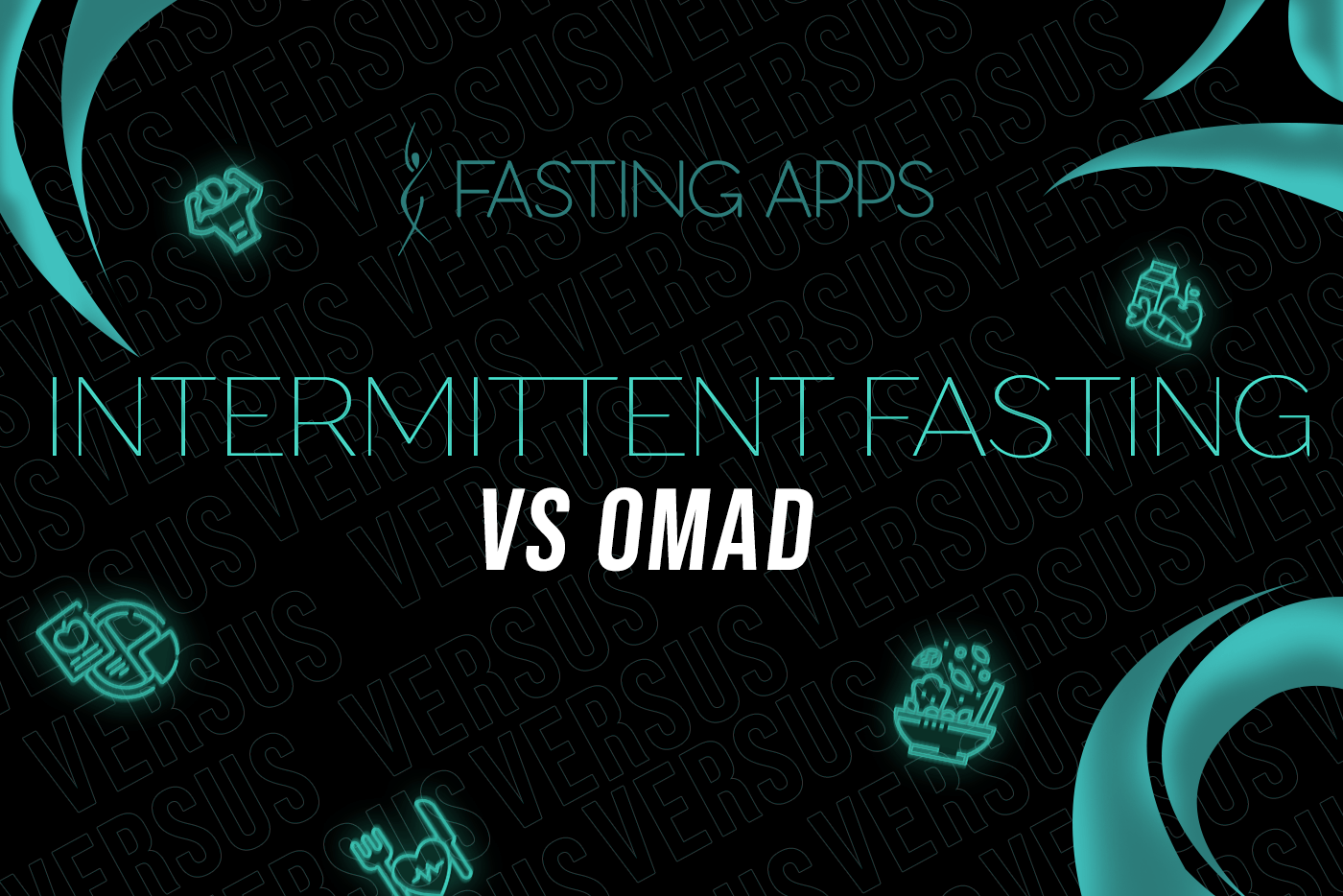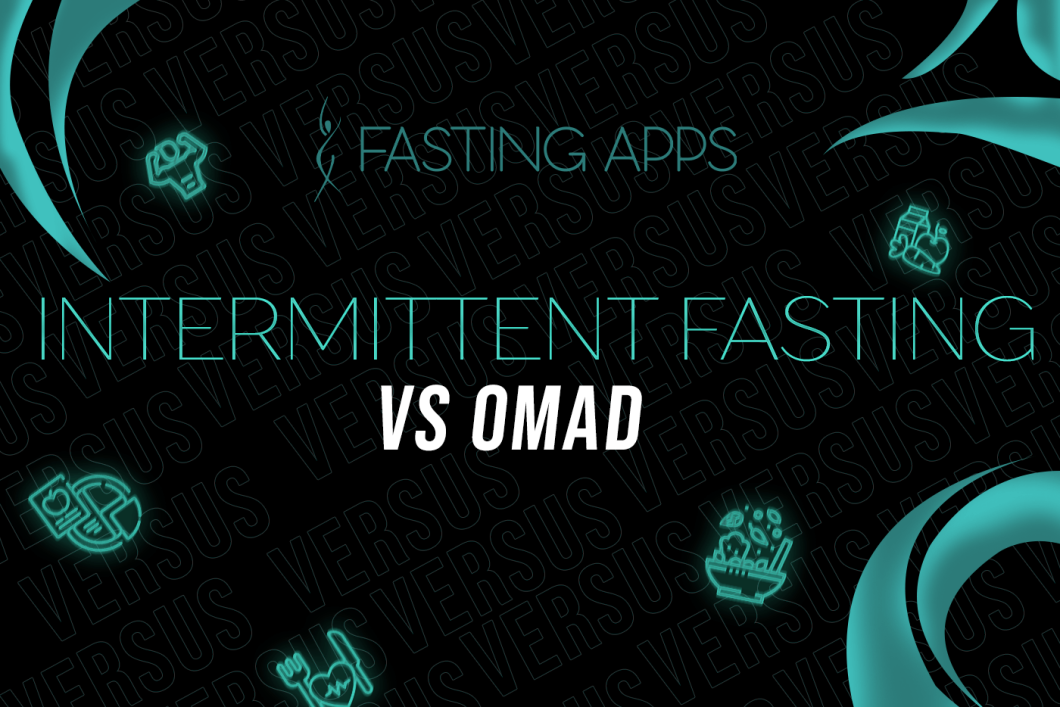Intermittent Fasting vs OMAD
Written by Andrew Brewer. ⚕️Reviewed and fact checked by our medical team.

Intermittent fasting is when you limit your eating to a certain amount of time. The time you choose depends on your lifestyle. You can go days without eating if you have worked up to it. One Meal a Day (OMAD) is a type of intermittent fasting, but instead of allowing you to eat for a certain amount of hours per day, it asks you to eat one meal per day. You’ll consume all your daily calories in a single meal, so it’s essential that you pack your daily allotment of nutrients in this meal, supplementing with vitamins as needed.
Key Takeaways
Intermittent fasting and OMAD are both forms of fasting that offer a range of health benefits, including weight loss, improved metabolism, and better sleep.
OMAD is a stricter form of fasting that involves eating only one meal per day, while intermittent fasting allows for more flexibility in terms of when and how often you eat.
The benefits of both forms of fasting depend on the length of the fasting window, with longer fasts generally providing greater health benefits.
Both intermittent fasting and OMAD can lead to calorie reduction, which can help with weight loss, but it's important to focus on healthy eating to ensure that you get all the necessary nutrients.
Choosing the right fasting plan depends on individual goals and preferences, so it's essential to understand the differences between the two and decide which one works best for you.
Benefits of Intermittent Fasting
Intermittent fasting is a powerful weight loss tool, but you’ll also get additional benefits as you allow your body the time to heal during the fasting windows. Depending on the amount of time you fast, your body will enter autophagy, helping it regenerate dead and dying cells, replacing them with healthy ones. Additionally, you can promote gut health, resting your gut biome to prevent digestional issues. You can boost your metabolism, improve your sleep, lower your insulin levels, and so much more. Intermittent fasting is flexible, and you can choose a plan that works best for and your lifestyle.
Benefits of OMAD
OMAD is strict, so if you have a lot of self-control, this may be the intermittent fasting plan for you. Typically, you’ll fast for 23-hours per day, eating all your calories in one hour. You don’t have to restrict your calories if you don’t want to, but you’ll want to focus on healthy eating. It will help you lose weight, particularly body fat. It can also improve your metabolism and help you feel more awake and alert, as long as you don’t eat breakfast. Keep in mind this is a form of calorie restriction, so you’ll see similar results.
What are the Differences?
While OMAD is a type of intermittent fasting, there are key differences between the two that may impact your decision.
Weight Loss
Weight loss will vary based on the time you’re fasting. You may lose more weight on longer intermittent fasts, including OMAD, though keep in mind that OMAD is a form of intermittent fasting with the added benefit of calorie restriction. Any time that your body is in a calorie deficit, it will lose weight, breaking down fat stores to burn for fuel. The amount depends on what and how often you eat.
Improve Overall Health
You’ll get similar health benefits when talking about OMAD and intermittent fasting, though the type will depend on how long you’re fasting. OMAD has been shown to reduce hyperinsulinemia, control diabetes and improve metabolic syndrome. Early evidence suggests that widening the fasting window can improve these benefits, so if you are looking to control health issues, consider longer-term fasts, including alternate-day fasting for best result.
Calorie Reduction
OMAD restricts your calories to one meal, and while it doesn’t ask that you restrict the amount of calories you eat in a day, it does make it difficult to overeat. You are limited to one meal per day, and you want to make the most of it, packing your eating window with protein, fiber, and healthy fats. You should eat lots of fruits and vegetables. Healthy eating will naturaly reduce the amount of calories you consume, though indulging once in a while is okay.
How to Choose?
Identify your goals and pick a plan accordingly. OMAD can be more restrictive, so if you’re looking for more flexibility in what and when you eat, you may want to try intermittent fasting. You will lose weight on both plans as long as you pair it with healthy eating.
Our #1 Recommendation: DoFasting
It's easily one of the best intermittent fasting apps that offers plenty of features for anyone!
Use coupon code: 10app to get an extra 10% off all memberships.
FAQ
What are the benefits of OMAD?
OMAD may promote weight loss, improve insulin sensitivity, and reduce inflammation. It can also simplify meal planning and save time.
Is OMAD more effective for weight loss than intermittent fasting?
There is no one-size-fits-all answer to this question. Both IF and OMAD can be effective for weight loss, but it depends on the individual and their dietary needs.
Is OMAD safe?
OMAD can be safe for some people, but ensuring you get all the necessary nutrients in one meal is important. It is also important to consult a healthcare provider before starting any new diet.
Can I drink water during OMAD?
Yes, you can drink water, coffee, and tea during the fasting period of OMAD.
Can I exercise while doing intermittent fasting or OMAD?
Yes, you can exercise while doing either intermittent fasting or OMAD. However, it is important to listen to your body and ensure you get enough nutrients and energy to sustain your workouts.
Can I do intermittent fasting or OMAD if I have a medical condition?
It is important to consult with a healthcare provider before starting any new diet, especially if you have a medical condition or are taking medication. Some medical conditions may not be compatible with fasting, so getting professional advice before starting is important.

